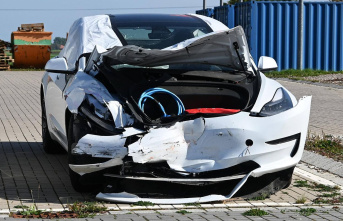An energy expert has warned against capping the price of gas in the EU. "It will not be easy to play around with the energy markets," said Simone Tagliapietra from the Brussels think tank Bruegel of the German Press Agency. As a risk he mentioned that suppliers could send their gas somewhere else.
China is currently consuming little gas, also because of the strict corona restrictions there. But it is unclear whether this will remain the case in the coming year. "We have to compete strongly with them to get LNG," Tagliapietra said of liquefied gas supplies, with which the EU wants to replace Russian gas.
For months, the EU has been discussing solutions to lower the gas price and thus also make electricity cheaper, since the prices are related. More than half of the EU countries have demanded a maximum price for gas in European wholesale and for imports. The pressure seems to be working: in a speech on Wednesday, EU Commission President Ursula von der Leyen was open to a fundamental lid for the first time. "Such an upper limit for gas prices must be designed in such a way that security of supply is guaranteed," she said in the EU Parliament.
"Reduce gas consumption, not increase it"
The devil is in the details - namely where exactly the price should be limited. One model von der Leyen has proposed is a price cap only for the gas used to generate electricity. Spain and Portugal had introduced something similar. The risk here, however, is that gas consumption will increase, as in Spain, because the price difference is paid by the state, says Tagliapietra. "We can't afford that because we have to reduce our gas consumption, not increase it."
Other suggestions are to temporarily limit the price in European wholesale or for imports. There are different variants here, such as setting a range of possible prices instead of a fixed cap. In a letter to the heads of state and government of the EU, von der Leyen spoke of a "price corridor" for suppliers like Norway. At a summit on Friday, EU leaders will discuss options.
"Basic problems are always the same"
However, the Bruegel expert warns: "You can camouflage the lid in many different ways, but I think the fundamental problems are always the same." Gas consumption increases. It is unclear how to pay for the price difference and security of supply should not be jeopardized.
Another aim of the Commission is to develop a price index that better reflects the market. The authority also hopes that this will result in lower prices. "I'm not sure that such interventions would be useful," said Tagliapietra. One must also change all long-term contracts that refer to the current trading index TTF.
Basically, it is necessary to use less gas and thus lower the price, says Tagliapietra. In addition, one must talk about European mechanisms so that countries with little money can also support their companies. "Otherwise the internal market will be fragmented." Germany's defense shield, which is worth up to 200 billion euros, was sometimes seen as going it alone.








